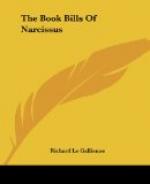It occurs to me here to wonder whether there can be any reader ungrateful enough to ask with grumbling voice, ’What of the book-bills? The head-line has been the sole mention of them now for many pages; and in the last chapter, where a book was referred to, the writer was perverse enough to choose one that never belonged to Narcissus at all.’ To which I would venture to make humble rejoinder—Well, Goodman Reader, and what did you expect? Was it accounts, with all their thrilling details, with totals, ‘less discount,’ and facsimiles of the receipt stamps? Take another look at our first chapter. I promised nothing of the sort there, I am sure. I promised simply to attempt for you the delineation of a personality which has had for all who came into contact with it enduring charm, in hope that, though at second-hand, you might have some pleasure of it also; and I proposed to do this mainly from the hints of documents which really are more significant than any letters or other writings could be, for the reason that they are of necessity so unconscious. I certainly had no intention of burdening you with the original data, any more than, should you accept the offer I made, also in that chapter, and entrust me with your private ledger for biographical purposes, I would think of printing it in extenso, and calling it a biography; though I should feel justified, after the varied story had been deduced and written out, in calling the product, metaphorical wise, ’The private ledger of Johannes Browne, Esquire’—a title which, by the way, is copyright and duly ‘entered.’ Such was my attempt, and I maintain that I have so far kept my word. Because whole shelves have been disposed of in a line, and a ninepenny ‘Canterbury’ has rustled out into pages, you have no right to complain, for that is but the fashion of life, as I have endeavoured to show. And let me say in passing that that said copy of Mr. Rhys’s Whitman, though it could not manifestly appear in his book-bills, does at the present moment rest upon his shelf—’a moment’s monument.’
Perhaps it would be well, before proceeding with this present ’place in the story,’ to set out with a statement of the various ‘authorities’ for it; as, all this being veritable history, perhaps one should. But then, Reader, here again I should have to catalogue quite a small library. However, I will enumerate a few of the more significant ones.
‘Swinburne’s Tristram of Lyonesse, 9/-, less dis., 6/9.’
All that this great poem of ’springtide passion with its fire and flowers’ meant to Narcissus and his ‘Thirteenth Maid’ in the morning of their love, those that have loved too will hardly need telling, while those who have not could never understand, though I spake with the tongue of the poet himself. In this particular copy, which, I need hardly say, does not rest upon N.’s shelves, but on another in a sweet little bedchamber, there is a tender inscription and a sonnet which aimed at acknowledging how the hearts of those young lovers had gone out to that poet ‘with mouth of gold and morning in his eyes.’ The latter I have begged leave to copy here:—




